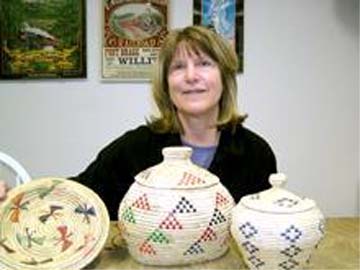
Her research led Rank to recognize that traditional Yup'ik place-names contain ecological and cultural information used by earlier generations to find good fishing, hunting and other subsistence resources. She found that although the names may have been familiar to descendants, the younger generation often had not recognized what the name was telling them, and no longer used many of the sites. The thought of potentially being able to reconstruct Yup'ik landscape interpretation from the verbal maps composed of these ancient descriptions is what draws her to return to Fairbanks in the dead of winter.
Rank served as a Peace Corps volunteer in Togo,West Africa in the 1960's building mud stoves with village women. "We trained rural women and government agents in fuel-efficient woodstove construction and reforestation techniques," she recalls her work in Africa, where she organized local schools to establish tree nurseries. She co-coordinated and addressed the First National Conference on Appropriate Technology in Kara, Togo, in December 1987.
Togo RPCV Louann Ranks worked with rural Yup'ik Eskimo communities doing oral history interviews with Yup'ik elders and leaders related to traditional subsistence practices, and exploring a collection of taped interviews and maps made by the Bureau of Indian Affairs as part of the Alaska Native Claim Settlement Act of 1971
SNOW QUEEN: Louann Ranks prepares to head back to Alaska
By Fae Woodward/TWN Staff Writer
Article Launched: 12/20/2006 10:44:13 AM PST
Caption: Louann Rank with grass baskets made by the Yup ik people she worked with in... (The Willits News)
Driving from Fairbanks via the Alaska Highway to Williits in September to care for her father, Robert Rank, until his death last November, Louann Rank is momentarily remembering the warmth of her stays in Africa in the 1980s while facing her return in January to the land of ice and snow.
An assistant professor of rural development at the University of Alaska in Fairbanks - before leaving in 2002 to complete interdisciplinary doctoral studies at the university - she had been working with rural Yup'ik Eskimo communities. With her doctoral studies, she began doing oral history interviews with Yup'ik elders and leaders related to traditional subsistence practices, and exploring a collection of taped interviews and maps made by the Bureau of Indian Affairs as part of the Alaska Native Claim Settlement Act of 1971. The latter had been required as part of negotiations to construct the Alaska Pipeline across the state.
That research led Rank to recognize that traditional Yup'ik place-names contain ecological and cultural information used by earlier generations to find good fishing, hunting and other subsistence resources. She found that although the names may have been familiar to descendants, the younger generation often had not recognized what the name was telling them, and no longer used many of the sites.
The thought of potentially being able to reconstruct Yup'ik landscape interpretation from the verbal maps composed of these ancient descriptions is what draws her to return to Fairbanks in the dead of winter.
Born in Youngstown, Ohio, Rank says her family moved around quite a bit and at one time resided in Amish country. They came to Menlo Park in California where they remained until their daughter, Louann, was a high school senior. Her senior year they relocated to Longview in East Texas.
However, California drew her back, and she attended the University of California at Berkeley receiving her bachelor of arts degree in social science in 1974. While residing in Berkeley, she was employed by the U.S. General Services Administration in San Francisco as correspondence supervisor for a national sale of Carson City silver dollars..
Later, studying natural resource sustainability in African development at Humboldt State University, she obtained her master of arts degree in social science in 1983, and then attended Yale University's School of Forestry and Environmental Studies in its master of environmental studies program in 1984-85.
January, 1986, found Louann Rank serving as a Peace Corps volunteer in Togo,West Africa building mud stoves with village women. "We trained rural women and government agents in fuel-efficient woodstove construction and reforestation techniques," she recalls her work in Africa, where she organized local schools to establish tree nurseries. She co-coordinated and addressed the First National Conference on Appropriate Technology in Kara, Togo, in December 1987.
Her memories of living and working side by side with the African people have often made her think fondly of those years and of perhaps returning to the tropics, especially during the short winter days and long winter nights of Alaska. However, just as she grew close to the natives of Africa, she also has grown close to native Alaskans with whom she has worked since December 1988.
It was after serving in Africa, she accepted the position of rural services coordinator in the community of Bethel, Alaska, 400 miles west of Anchorage. Leaving the lushness of the African country side, she found herself in a subarctic town surrounded by 50,000 square miles of treeless, roadless tundra.
The Kuskokwim River, on which Bethel is located, while frozen over in the winter becomes a state highway, according to Rank. She traveled by small plane across the frozen terrain to the homes of the developmentally disabled residents in the region to organize village-based support services. This she did working through the Yup'ik tribal councils.
Her work was welcomed by this indigenous people and in January 1990, she became director of the Bethel Community Services' Developmental Disabilities Program, designing and supervising a program of rural services to the Yup'ik Eskimo communities of the Yukon-Kuskokwim Delta of southwestern Alaska.
In this position she wrote annual grant proposals for state funds, participated in state committees and collaborated with tribal councils, regional agencies and local school districts to advocate for clients.
In between the years of her work with the Yup'ik people, from 1993-1997 she was a student in the Department of Sociology at Utah State University, where she studied the sociology of international development and natural resources, and traveled to eastern Morocco to interview migratory women sheep herders related to fuel wood concerns.
Upon completion of these studies, she became administrator of Developmental Disabilities and Mental Health in Bethel, where much of her time was spent directing three residential treatment and rehabilitation programs providing service to individuals experiencing chronic mental illness and/or developmental disabilities. She was later family services coordinator for the Yukon-Kuskokwim Health Corporation.
It was in August 1999, she became a member of the faculty at the University of Alaska at Fairbanks, in the Department of Alaska Native and Rural Development, beginning in Bethel and then moving further north to Fairbanks, where she reports it is colder than the southwestern tundra region.. From 1999 to 2002 she taught courses in rural development, primarily to many native Alaskans, some from the communities in which she had worked earlier.
"A number of these classes were distance delivered by teleconference," she says. She feels students actually were more relaxed sharing their thoughts with the others over the telephone than they might have been in the classroom. These students did meet twice a semester, however, for on-site seminars that included what they called a potlatch (much like the familiar potluck) in which they shared dishes from their regions and had the opportunity for social interaction.
Rank says her Department of Alaska Native Rural Development students studied courses in rural development from a global perspective. They studied community development strategies; management of community development programs; community planning; grant writing and cultural impact analysis.
During her doctoral studies at UAF from 2002-2003, Rank worked for a year as subsistence resource specialist and graduate intern with the Alaska Department of Fish and Game, Division of Subsistence. She says it was her job to create CD-Rom databases indexing traditional ecological knowledge and contemporary subsistence uses of non-salmon fish in several river drainages in central Alaska.
She began working with the Oral History Department of the university in March of 2004. It is with this program she has been interviewing Yup'ik elders, using audio recording and photography, and participating in the design of a webpage for curricula use in the school districts serving Yup'ik villages along the Kuskokwim River.
While visiting her parents in Willits over the years, Rank travels to the Bay Area which she feels contributed a great deal to who she has become. Growing up with her in Menlo Park and briefly in Texas were two sisters and a brother. One of those sisters, Carol Rank, now lives in Coventry, England, where she is a senior lecturer with the Centre for Peace and Reconciliation Studies at Coventry University. Her other sister and her brother reside in Mill Valley and San Rafael. Tom Rank, father of two sons, is a contractor. Lori Rank Bailey is marketing services manager with Panamax of Petaluma.
















